Have digestive trouble or strange symptoms after certain foods? You might be dealing with an enzyme deficiency. Enzymes help your body break down food and do other chemical jobs. When one is missing or not working well, food doesn’t get processed and symptoms show up.
Common enzyme problems are easy to miss. Lactase deficiency causes bloating, gas and diarrhea after milk. Pancreatic insufficiency makes meals feel heavy, causes greasy stools, and leads to weight loss. G6PD deficiency is different — it’s a genetic enzyme issue that can cause red blood cell breakdown after certain drugs, infections, or fava beans.
Symptoms depend on which enzyme is affected. Digestive enzyme problems usually cause bloating, cramps, gas, oily stools, and poor nutrient absorption. Non-digestive enzyme issues can show as tiredness, jaundice, or episodes of anemia. Timing matters: symptoms that start after specific foods or exposures are a big clue.
Testing is straightforward. For lactose, doctors use breath hydrogen tests or try a lactose-free trial to see if symptoms improve. Pancreatic function is checked with stool tests, blood tests, or imaging like an abdominal CT. G6PD deficiency is found with a simple blood test. Your doctor will pick the right test based on your symptoms and medical history.
Treatment depends on the cause. For lactose intolerance, avoid or reduce dairy and try lactase enzyme pills before eating milk products. For pancreatic insufficiency, doctors prescribe pancreatic enzyme replacement capsules to take with meals. G6PD deficiency is mostly about avoidance — don’t take trigger drugs, avoid fava beans, and treat infections quickly.
Diet changes help a lot. Keep a food diary to link foods with symptoms. Swap dairy for lactose-free or plant-based milk. Add small, frequent meals if large meals cause trouble. For fat-malabsorption from pancreatic issues, limiting very high-fat meals while using enzyme replacement often improves weight and stool consistency.
Medication interactions matter. If you have a genetic enzyme problem, tell every doctor and pharmacist. Some common antibiotics and pain relievers can trigger problems in people with G6PD deficiency. Pharmacists can check prescriptions and suggest safe alternatives.
When to see a doctor? If symptoms are severe, cause weight loss, persistent jaundice, or affect daily life, get evaluated. Also see a doctor before stopping or starting any medication linked to enzyme conditions. Early diagnosis prevents complications and gets you on the right treatment faster.
Simple steps make life better fast: track symptoms, try targeted diet tweaks, use over-the-counter enzyme supplements when appropriate, and talk to a clinician for testing and tailored treatment. With the right plan, most people manage enzyme deficiencies well and get back to normal routines.
Plan ahead when you travel: pack enzyme pills, scan labels for hidden dairy, and note nearby medical centers. Try a registered dietitian if symptoms persist; they can test food triggers and balance your diet. Join a patient group online to swap tips and trusted product names for enzyme supplements often.

Discover how enzymes prevent cancer, what happens when they're lacking, and practical steps to boost protective enzyme activity for better health.

In my recent research, I discovered a fascinating connection between a lack of enzymes and autoimmune disorders. It appears that when our bodies don't produce enough enzymes, it can weaken our immune system and make it vulnerable to various autoimmune diseases. On top of that, insufficient enzyme levels can lead to inflammation and poor digestion, further stressing our immune system. It's crucial for us to maintain a healthy diet and lifestyle to ensure our bodies produce enough enzymes to prevent these autoimmune disorders from developing. This discovery highlights the importance of staying informed about our health and taking necessary steps to protect it.
Discover how support groups boost emotional health, practical coping, and quality of life for relapsing‑remitting disease patients, with tips on finding the right community.
In my latest blog post, I discussed the crucial role of cycloserine in managing multidrug-resistant tuberculosis (MDR-TB). Cycloserine, an antibiotic, has become increasingly important in the treatment of MDR-TB, especially when other first-line medications are ineffective. This is because it targets the bacteria causing TB in a different way, thus overcoming resistance. However, it's essential to use cycloserine in combination with other antibiotics to ensure maximum effectiveness and minimize the risk of further resistance. Overall, cycloserine plays a vital role in the fight against MDR-TB, and ongoing research is crucial to optimize its use and develop new treatments.
Learn how to set up a simple, effective system to track medication costs and get automatic refill alerts-without expensive tools or complex software. Save money and avoid dangerous gaps in treatment.
Explore how ropinirole affects daytime sleepiness in Parkinson's patients, review key studies, compare alternatives, and learn practical tips to stay alert.
Psoriatic arthritis links skin psoriasis with joint pain and swelling. Learn the key signs like dactylitis and nail changes, how it differs from rheumatoid arthritis, and the latest treatments that can prevent joint damage.